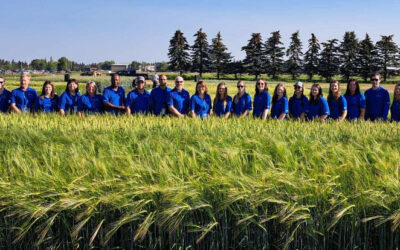A group of Australian National University (ANU) scientists has made a major breakthrough that could improve Australia’s food security during drought.
The Canberra-based researchers have spent the past decade looking at the effects of drought on plants, accidentally discovering some plants have a self-preservation method that is potentially life-saving.
One of the lead researchers, biologist Kai Chan, says the team found chloroplasts do more than capture sunlight through photosynthesis to make plant food.
Dr Chan said they found chloroplasts also worked together with plant hormones during drought stress.
“Chloroplasts are actually capable of sensing drought stress and telling the leaves to shut-up and prevent water from being lost during drought stress,” he said.
“So the chloroplasts are actually helping the plants to prevent losing too much water.
“We know how the drought alarm actually calls for help and we know how help comes in the form of closing pores on the leaves.”
The team made the discovery while conducting tests on barley and arabidopsis, a relative of canola and mustard.
They found boosting the levels of the chloroplast signal in these plants extended their drought survival by about 50 per cent.

ANU scientist Dr Kai Chan, who helped to discover the water saving properties of some plants. (Photo: Jana Black, ABC News)
Dr Chan described the discovery as a major breakthrough for farmers.
“We have got very strong reason to believe that this ability is also present in other major crops like rice and wheat,” he said.
“Imagine if you’re able to help those plants close their pores much earlier during drought that might actually help those crops survive just that little bit longer until the next rainfall. The find means farmers may be able to better protect their crops, like wheat and canola, during long bouts of drought.”
Dr Chan said he was working to develop a chemical spray to boost the chloroplast signal that closes pores on plant leaves.
Other collaborators are investigating plant breeding to naturally enhance levels of the chloroplast signal.
“Canberra is not particularly known as an agricultural area, but Canberra and the ANU is a centre of knowledge and technological breakthroughs that can help not just the Canberra region but globally as well.”
It is hoped the crop technology could be available within the next five to 10 years.
Source: ABC





